WBIR’s Emily Stroud paid a visit to one of our dear friends and supporters John Benzinger – a retired flower farmer who now puts his green thumb toward delivering hope!
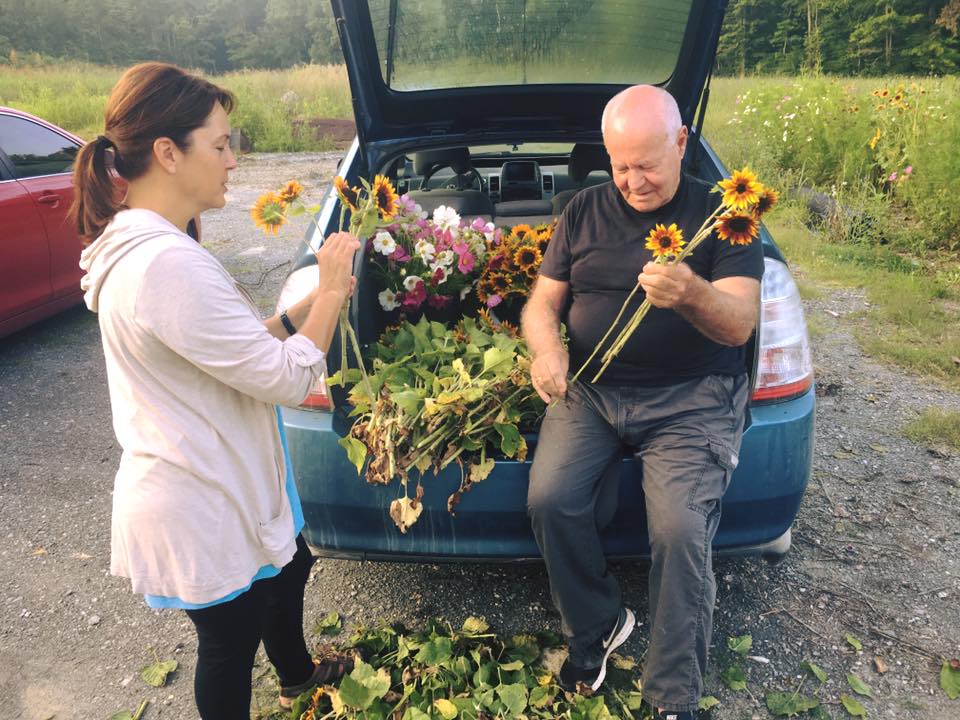

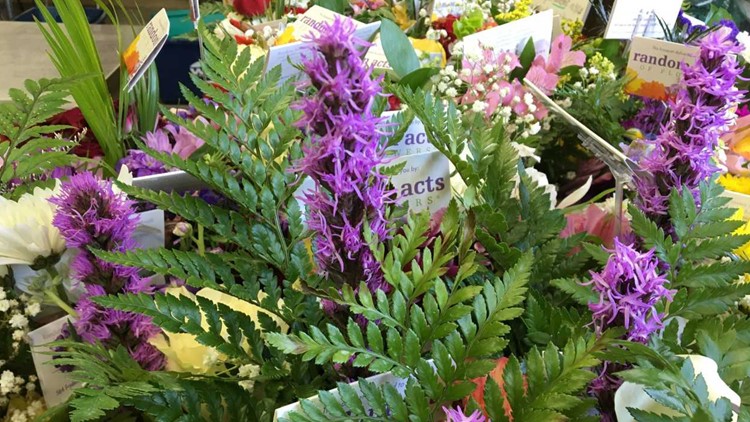

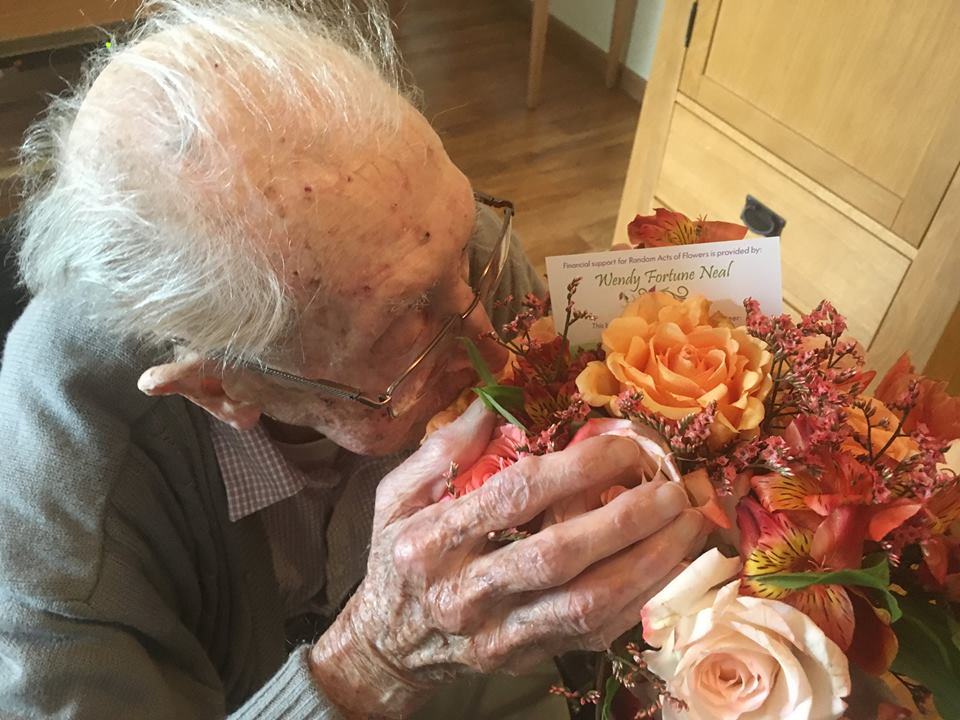
[imageframe lightbox=”no” gallery_id=”” lightbox_image=”” style_type=”none” hover_type=”none” bordercolor=”” bordersize=”0px” borderradius=”0″ stylecolor=”” align=”none” link=”” linktarget=”_self” animation_type=”0″ animation_direction=”down” animation_speed=”0.1″ animation_offset=”” hide_on_mobile=”no” class=”” id=””]  [/imageframe][fullwidth background_color=”” background_image=”” background_parallax=”none” enable_mobile=”no” parallax_speed=”0.3″ background_repeat=”no-repeat” background_position=”left top” video_url=”” video_aspect_ratio=”16:9″ video_webm=”” video_mp4=”” video_ogv=”” video_preview_image=”” overlay_color=”” overlay_opacity=”0.5″ video_mute=”yes” video_loop=”yes” fade=”no” border_size=”0px” border_color=”” border_style=”solid” padding_top=”20″ padding_bottom=”20″ padding_left=”” padding_right=”” hundred_percent=”no” equal_height_columns=”no” hide_on_mobile=”no” menu_anchor=”” class=”” id=””][fusion_text]Many of us will celebrate the longest day of the year – the Summer Solstice on June 21st – by spending time outside with our friends and family, soaking up the sun, and reveling in the fact that we’ve made it another year around the sun while twilight slowly settles around us. But, for many, this longest day has an even greater meaning. The Alzheimer’s Association of America has adopted the summer solstice as their Longest Day and say “The Longest Day is all about love. Love for all those affected by Alzheimer’s disease.”
[/imageframe][fullwidth background_color=”” background_image=”” background_parallax=”none” enable_mobile=”no” parallax_speed=”0.3″ background_repeat=”no-repeat” background_position=”left top” video_url=”” video_aspect_ratio=”16:9″ video_webm=”” video_mp4=”” video_ogv=”” video_preview_image=”” overlay_color=”” overlay_opacity=”0.5″ video_mute=”yes” video_loop=”yes” fade=”no” border_size=”0px” border_color=”” border_style=”solid” padding_top=”20″ padding_bottom=”20″ padding_left=”” padding_right=”” hundred_percent=”no” equal_height_columns=”no” hide_on_mobile=”no” menu_anchor=”” class=”” id=””][fusion_text]Many of us will celebrate the longest day of the year – the Summer Solstice on June 21st – by spending time outside with our friends and family, soaking up the sun, and reveling in the fact that we’ve made it another year around the sun while twilight slowly settles around us. But, for many, this longest day has an even greater meaning. The Alzheimer’s Association of America has adopted the summer solstice as their Longest Day and say “The Longest Day is all about love. Love for all those affected by Alzheimer’s disease.”
At Random Acts of Flowers, we’re honoring individuals battling Alzheimer’s, dementia, and other memory-related ailments by celebrating The Brightest Week on June 17-23. With financial support from Eli Lilly and Company, we will make 5,000 deliveries to memory care units at hospital and assisted living facilities in Indianapolis, Knoxville, Chicago, and Tampa Bay during this special week.
“Alzheimer’s has its grasp on more than 5 million people in the United States. But that isn’t just a statistic,” said Phyllis Ferrell, vice president, Lilly global Alzheimer’s disease platform. “It’s my dad. It’s my father-in-law. It’s mothers and fathers. Brothers and sisters. Friends and neighbors. And yes, because Alzheimer’s doesn’t discriminate based on age, it’s sometimes our sons and daughters.”
We encounter recipients facing Alzheimer’s disease at the hospitals and assisted living facilities that we visit on a regular basis. For them – and for us – a bouquet delivery is a welcome bright spot in a world that is turned upside down –[/fusion_text][two_fifth last=”no” spacing=”yes” center_content=”no” hide_on_mobile=”no” background_color=”” background_image=”” background_repeat=”no-repeat” background_position=”left top” hover_type=”none” link=”” border_position=”all” border_size=”0px” border_color=”” border_style=”” padding=”” margin_top=”” margin_bottom=”” animation_type=”” animation_direction=”” animation_speed=”0.1″ animation_offset=”” class=”” id=””][separator style_type=”none” top_margin=”30″ bottom_margin=”” sep_color=”” border_size=”” icon=”” icon_circle=”” icon_circle_color=”” width=”” alignment=”center” class=”” id=””][imageframe lightbox=”no” gallery_id=”” lightbox_image=”” style_type=”none” hover_type=”none” bordercolor=”” bordersize=”0px” borderradius=”0″ stylecolor=”” align=”none” link=”” linktarget=”_self” animation_type=”0″ animation_direction=”down” animation_speed=”0.1″ animation_offset=”” hide_on_mobile=”no” class=”” id=””]  [/imageframe][/two_fifth][three_fifth last=”yes” spacing=”yes” center_content=”no” hide_on_mobile=”no” background_color=”” background_image=”” background_repeat=”no-repeat” background_position=”left top” hover_type=”none” link=”” border_position=”all” border_size=”0px” border_color=”” border_style=”” padding=”” margin_top=”” margin_bottom=”” animation_type=”” animation_direction=”” animation_speed=”0.1″ animation_offset=”” class=”” id=””][fusion_text]“My elderly father who suffers from Alzheimer’s was recently admitted to UT Medical Center. He was placed on the oncology wing for lack of space elsewhere. Cancer patients tend to receive lots of flowers and visitors. Once someone has been diagnosed with Alzheimer’s, a disease we can only hope to manage not cure, friends and even family begin to distance themselves. The sweetest lady came in carrying a bright yellow basket full of carnations, hydrangeas, daffodils and sunflowers. My dad was so excited.
[/imageframe][/two_fifth][three_fifth last=”yes” spacing=”yes” center_content=”no” hide_on_mobile=”no” background_color=”” background_image=”” background_repeat=”no-repeat” background_position=”left top” hover_type=”none” link=”” border_position=”all” border_size=”0px” border_color=”” border_style=”” padding=”” margin_top=”” margin_bottom=”” animation_type=”” animation_direction=”” animation_speed=”0.1″ animation_offset=”” class=”” id=””][fusion_text]“My elderly father who suffers from Alzheimer’s was recently admitted to UT Medical Center. He was placed on the oncology wing for lack of space elsewhere. Cancer patients tend to receive lots of flowers and visitors. Once someone has been diagnosed with Alzheimer’s, a disease we can only hope to manage not cure, friends and even family begin to distance themselves. The sweetest lady came in carrying a bright yellow basket full of carnations, hydrangeas, daffodils and sunflowers. My dad was so excited.
He said, “Those flowers brighten up the whole room, don’t they?” It is amazing how something as small as a basket of flowers can mean so much. Many, many thanks.” – Joanie H.[/fusion_text][/three_fifth][fusion_text]
“I want to thank you from the bottom of my heart for all the flower arrangements you brought. I am especially grateful for the flowers in our Memory Support rooms. My husband has been there since it opened in 2009, and flowers brightened his room until the last petal fell, brightening the days for him, me, and all the caretakers. What pleasure you have given to all of us, and I want you to know how much I appreciate the surprise.” – Marcia E.
And, research has shown that a familiar smell can bring back memories from the past. A study from Jeannette Haviland-Jones, Ph.D at Rutgers University “finds flowers decrease depression, encourage companionship and enrich short-term memories in seniors.”
Sunny Biden from The Pat Summitt Foundation (an organization in Knoxville, TN, fighting Alzheimer’s disease) says “with Alzheimer’s the first thing to go is, short-term memory, so bringing flowers to someone… there’s something nostalgic about a flower that reminds someone of a memory. So, if someone gets a certain flower that they loved, it might bring back a childhood memory that they’re more inclined to remember than a short-term memory.”
Flowers have the ability to brighten a person’s room and their spirits; and, through Eli Lilly and Co.’s generous support, Random Act of Flowers will be able to deliver hope, healing, and personal moments of kindness to 5,000 individuals during The Brightest Week.[/fusion_text][/fullwidth]

[fusion_text] If there’s ever a season punctuated by flora, it’s spring. In-bloom flowers awaken in every garden and at every grocery store. TBH, just simply looking at them functions as therapy, which is something that’s not lost on sisters Christine and Caroline Strzalka, who want to make stems an everyday part of life.
If there’s ever a season punctuated by flora, it’s spring. In-bloom flowers awaken in every garden and at every grocery store. TBH, just simply looking at them functions as therapy, which is something that’s not lost on sisters Christine and Caroline Strzalka, who want to make stems an everyday part of life.
This year, the duo launched their bouquet subscription service, [RAF Supporter] It’s By U, which offers DIY farm-fresh flower-arranging subscription kits that are suitable for even the most amateur of floral stylists. “One of the things we’re trying to do is allow people have flowers in their lives more often,” says Christine. “They’re not just for gifting or special events—they should always be in your home or office.”
[/fusion_text]
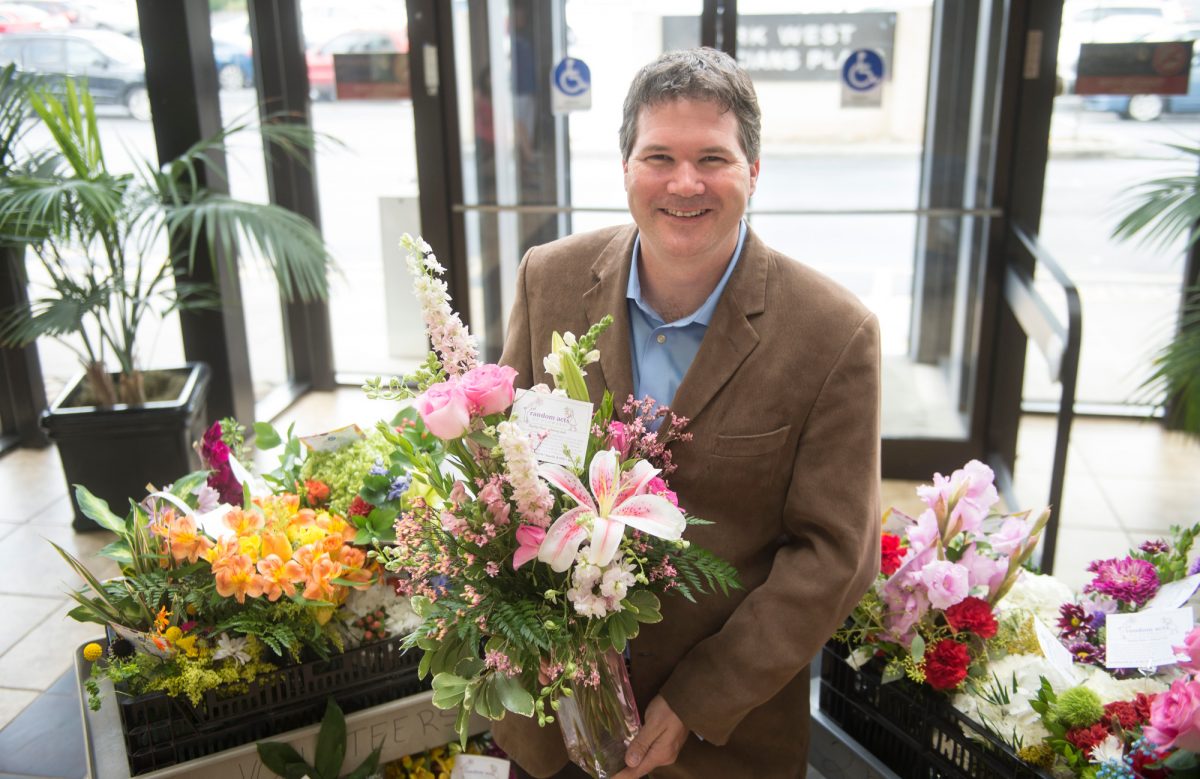
[fusion_text]
[/fusion_text][youtube id=”eexwprB8zLc” width=”1200″ height=”800″ autoplay=”no” api_params=”” class=””][/youtube]
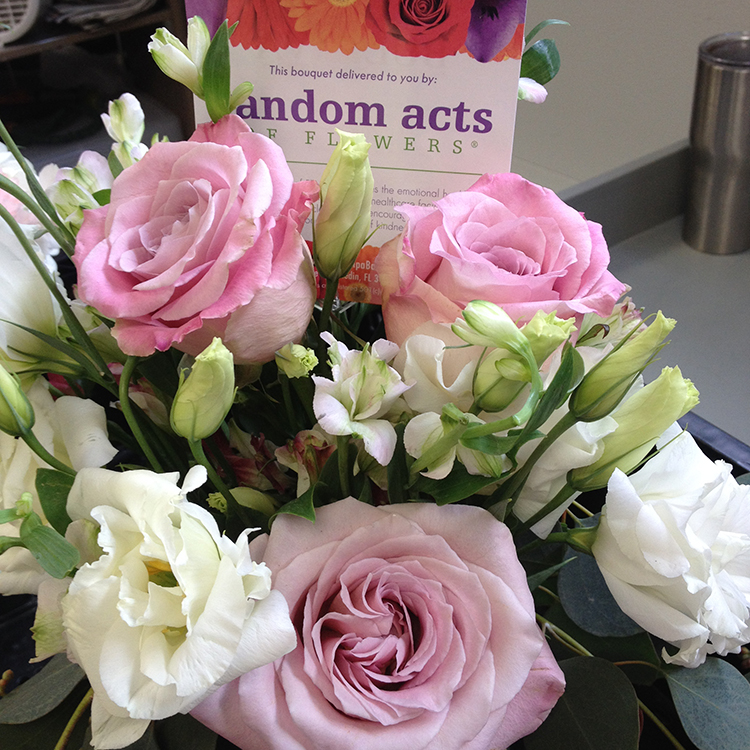
“The trick to keeping flowers fresh and beautiful is keeping them cool. Proper temperature control is even more important when flowers are recycled. And it can be a major challenge, particularly in the summer, where temperatures in Silicon Valley average in the 80s.
‘Our workshop isn’t well ventilated,’ Fairclough says. ‘There aren’t any windows. During the summer, our flowers were just dying by the day because of the excessive heat that was building up in the workshop.’
To beat the suffocating heat, Fairclough and her team built a mock cold room using an air conditioner and some plastic sheeting. It was better but still didn’t cut it. Thankfully, one of her volunteers happened to be a freelance florist who knew about the CoolBot. So, Fairclough picked up the phone and gave us a call” …

by Sara Nahrwold
In just one year, Random Acts of Flowers Indianapolis has delivered more than 17,000 flower arrangements to the area’s most vulnerable residents in hospitals, nursing homes and hospice facilities. The organization already has its eyes on year number two.
“It’s been great, overwhelming,” Lindsay Potter, program director for Random Acts of Flowers, said.
Since its inception, the business has stayed true to its mission — to improve the emotional health and well-being of individuals in health care facilities by delivering recycled flowers, encouragement and personal moments of kindness. Now, it’s looking to continue fulfilling that mission by adding another partner.
Potter recently met with Linda Ryser, patient liaison and manager of service excellence and volunteer services at Indiana University Health West Hospital in Avon. Ryser said the two talked about the mission, the history of the business and the organizational structure of the company.
“IU Health West enthusiastically agreed to partner with Random Acts of Flowers,” Ryser said. “Besides their mission of providing encouragement and kindness to patients, Random Acts of Flowers is also dedicated to recycling 100 percent of the arrangements they receive in order to keep these floral materials out of landfills. This is hugely important to the employees of IU Health West who have been participating in a recycling program at our hospital for several years.”
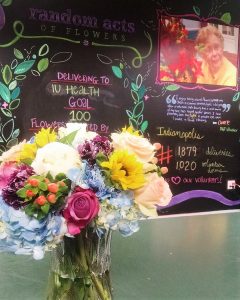 The Beginning
The BeginningThe Indianapolis chapter is part of the national organization of Random Acts of Flowers. The company’s founder and CEO, Larsen Jay, was in a near fatal accident in 2007. He was overwhelmed at the hospital with flowers from people showing their support and said that impacted his recovery.
“He saw people come and go that didn’t have visitors,” Potter said. When he got better, he repurposed his flowers and set out to deliver the first “random act of flowers.”
The company then formed in 2008 in Knoxville, Tenn., and has added locations in Chicago, Silicon Valley, Tampa Bay and Indianapolis.
Random Acts of Flowers operates within a 30-minute radius from Indianapolis. The company has delivered to locations in Plainfield and Brownsburg.
Donated flowers are brought to the organization’s shop, whether that’s by individuals or companies. Random Acts of Flowers receives flowers from funerals, weddings, wholesalers (flowers that didn’t sell) and grocery stores (because of sell-by dates).
“We aren’t competing with the floral industry, we depend on the floral industry,” Potter said.
For example, someone can’t call Random Acts of Flowers and send $30 to have flowers delivered to grandma at the hospital. That still falls under the floral industry.
Once the flowers arrive, the real magic begins.
“We have a team that takes everything apart and sorts through what we can/can’t use,” Potter said. “We compost what we can’t use.”
Once the flowers are sorted and deemed good enough to reuse, arranging begins. The volunteers usually have a goal to make about 200 flower arrangements a day.
Afterwards, the flowers are delivered with the help of staff at hospitals and nursing homes and Random Acts of Flowers volunteers.
The organization works closely with hospitals and other medical facilities to figure out who to give the flowers to. Some base it on who needs it the most, who hasn’t gotten flowers/visitors or if someone receives life-changing news. Other hospitals have a policy if one person on the floor gets an arrangement, then everyone does.
“We believe in the power of flowers to enhance moods,” Potter said. “It’s really about that connection.”
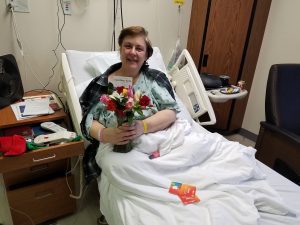
Looking ahead, Random Acts of Flowers Indianapolis hopes to deliver around 25,000 arrangements next year.
“We are trying to create new partnerships with hospitals,” Potter said. “We constantly want to find new places and new flowers to rescue.”
Random Acts of Flowers is finalizing the preparatory work with the hospital in hopes that the bouquets will be delivered to patients within the next few months.
Overall, the success has been overwhelming. “Indianapolis has been great for [Random Acts of Flowers],” Potter said. “There’s a wonderful floral community here.”
One of the big areas the organization needs help with is vases, which can also be donated at the office. They go through about 300 a week.
“When you see an organization such as Random Acts of Flowers reaching out and sharing joy in this way, it not only lifts the spirits of the patients, but also their families and friends, the caregivers who treat the patients, and the community as a whole,” Ryser said.
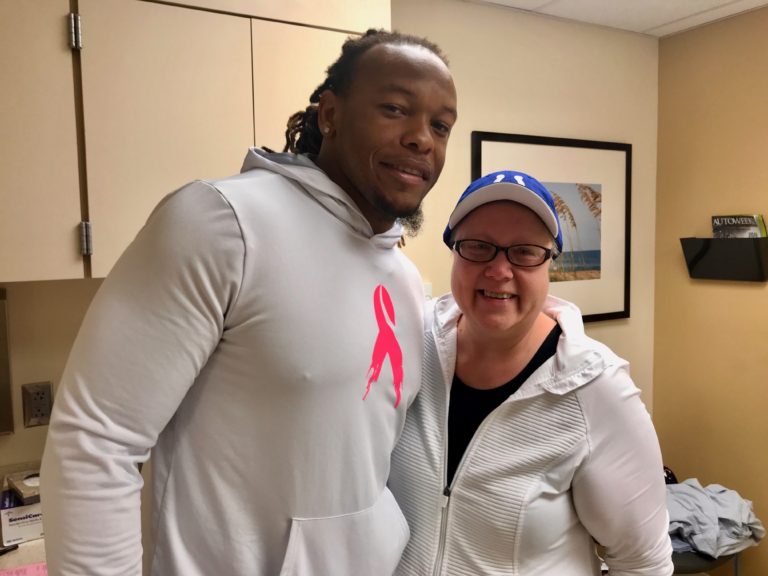
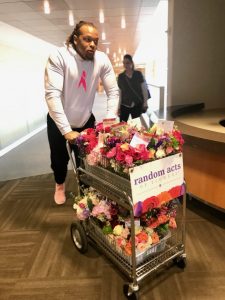 Tuesday was a day off for Colts linebacker Jabaal Sheard – his only day off of the week. He could have spent it any way he wanted to. But what he wanted to do was spread happiness.
Tuesday was a day off for Colts linebacker Jabaal Sheard – his only day off of the week. He could have spent it any way he wanted to. But what he wanted to do was spread happiness.
“I know it’s Breast Cancer Awareness Month and I thought, ‘What can I do to bring someone a smile?’ And I thought of flowers.”
He teamed up with Random Acts of Flowers and walked the halls of IU Health’s Simon Cancer Center delivering flowers to breast cancer patients.
“Hey, beautiful. I’ve got some flowers for you,” he said as he strolled into Heidi Reimer’s examination room. “It’s Breast Cancer Awareness Month. I just wanted to come out and put a smile on your face.”
by Heather Lloyd

[youtube id=”YiRc1ZUrHMI” width=”1200″ height=”700″ autoplay=”yes” api_params=”” class=””]
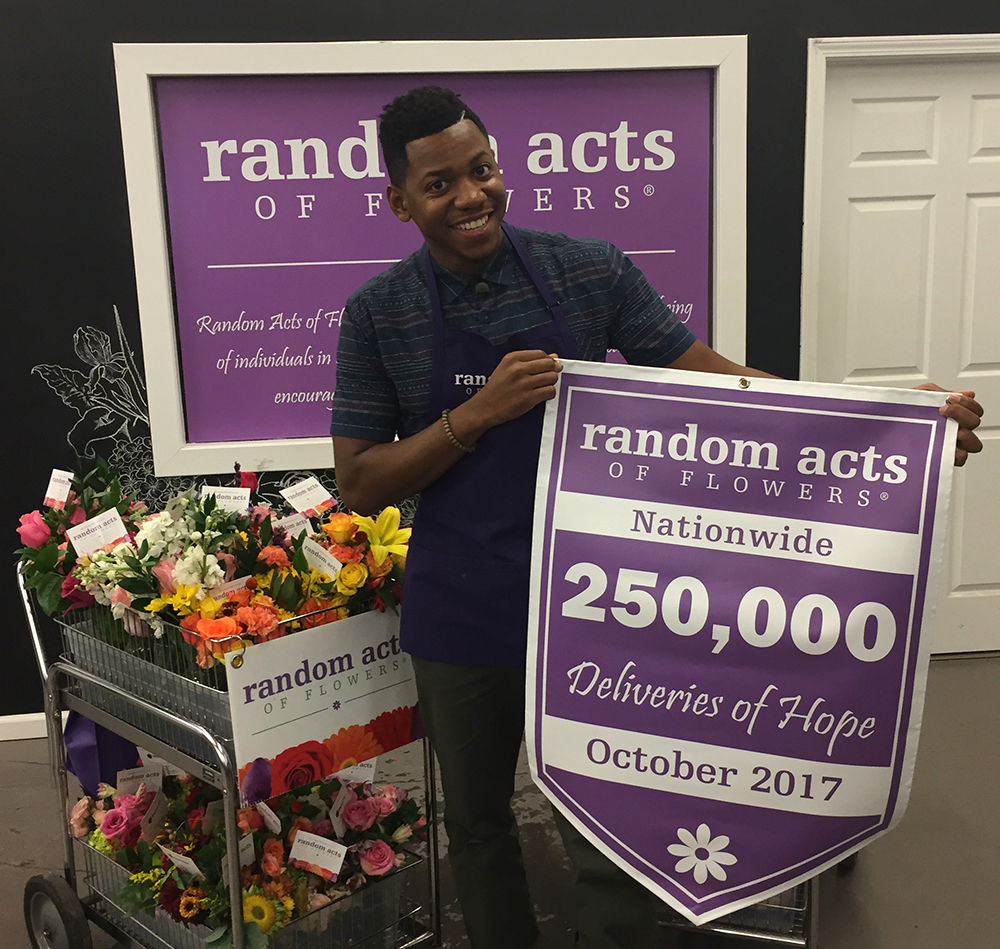
[vimeo id=”237920323″ width=”900″ height=”525″ autoplay=”no” api_params=”” class=””]
It is such a simple idea, and yet it has had such a meaningful impact on a quarter million people across the country who are battling injury, illness and the aging process.
Today marks the 250,000th delivery by Random Acts of Flowers, the national nonprofit that improves the emotional health and wellbeing of individuals in healthcare facilities by delivering recycled flowers, encouragement and personal moments of kindness. The special moment is set to take place at Chicago’s Advocate Lutheran General Hospital, with rising pop star and winner of The Voice, Chris Blue, Joining volunteers in delivering the healing bouquets to oncology patients in honor of Breast Cancer Awareness Month.

“I never imagined how far reaching this would be when we started Random Acts of Flowers,” said founder and CEO Larsen Jay, who was moved to give back after suffering a near-fatal accident and personally experiencing the healing power of flowers during his recovery. (See the RAF story.) “We owe so much to the thousands of volunteers, the community leaders, our partners and our donors who share our vision to nurture a culture of care and compassion.”
Blue is one of those who shares the vision of Random Acts of Flowers, so much so that he is breaking away from working on his first album in New York with mentor Alicia Keys to make the 250,000th delivery.
“It fits with what I want to do with my music and who I want to be in life,” said Blue, who wowed The Voice judges and viewers alike with his incredible voice range and musical versatility. “I want to inspire people, to be the light and glue to bring people together. That’s what Random Acts of Flowers does every day, offering hope and light to those who are suffering and lonely.”
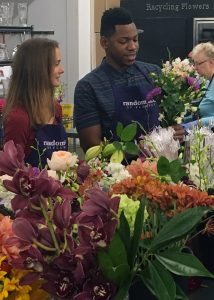 Numerous studies have shown flowers have a positive impact on patient recovery, with those who have flowers or plants in their rooms experiencing shorter hospital stays and reporting less pain, anxiety, and fatigue. Additionally, flowers have been proven to be a positive emotion-inducer, improving mood and long-term episodic memory in elderly patients.
Numerous studies have shown flowers have a positive impact on patient recovery, with those who have flowers or plants in their rooms experiencing shorter hospital stays and reporting less pain, anxiety, and fatigue. Additionally, flowers have been proven to be a positive emotion-inducer, improving mood and long-term episodic memory in elderly patients.
Random Acts of Flowers was launched in 2008 in Jay’s hometown of Knoxville, Tenn. Its mission quickly spread across the country with additional branches opening in Tampa Bay, Chicago, Silicon Valley and Indianapolis, where a small team and thousands of dedicated volunteers work every day to remind some of the most vulnerable members of their communities that they are loved and cared for.
Nationally, Random Acts of Flowers serves more than 650 healthcare facilities, including hospitals, hospices, dialysis centers, chemotherapy infusion centers, senior living facilities, nursing homes and adult day cares. Advocate Lutheran General Hospital, the premier academic referred hospital for northwest Chicago and north Chicagoland, is one of RAF Chicago’s newest healthcare partners. The 638-bed research hospital offers the most advanced care in its Level I trauma center, Cardiovascular, Orthopedic, Advanced Surgery, Oncology and Neuroscience Centers of Excellence.